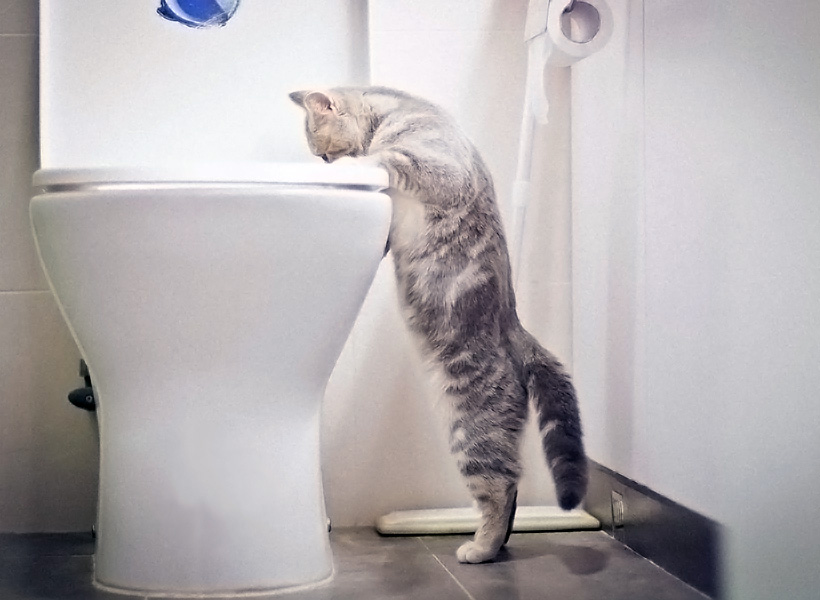The Dangers of Flushing Cat Poop Down Your Toilet - Advice for Safer Disposal
The Dangers of Flushing Cat Poop Down Your Toilet - Advice for Safer Disposal
Blog Article
This article down below about Can You Flush Cat Poop Down The Toilet? is definitely stimulating. Check it out yourself and decide what you think of it.

Introduction
As feline owners, it's important to be mindful of exactly how we get rid of our feline good friends' waste. While it may seem hassle-free to flush pet cat poop down the bathroom, this technique can have detrimental effects for both the atmosphere and human health and wellness.
Alternatives to Flushing
Thankfully, there are more secure and extra liable methods to throw away pet cat poop. Consider the adhering to choices:
1. Scoop and Dispose in Trash
The most usual technique of throwing away pet cat poop is to scoop it into a naturally degradable bag and throw it in the trash. Make certain to use a committed trash scoop and dispose of the waste promptly.
2. Usage Biodegradable Litter
Go with eco-friendly feline clutter made from materials such as corn or wheat. These trashes are eco-friendly and can be securely disposed of in the trash.
3. Hide in the Yard
If you have a backyard, consider burying cat waste in a marked area far from vegetable gardens and water resources. Make certain to dig deep sufficient to prevent contamination of groundwater.
4. Mount a Pet Waste Disposal System
Buy a family pet waste disposal system particularly made for cat waste. These systems use enzymes to break down the waste, decreasing smell and environmental influence.
Health Risks
In addition to environmental concerns, flushing cat waste can also posture health and wellness threats to human beings. Feline feces may include Toxoplasma gondii, a parasite that can create toxoplasmosis-- a possibly serious disease, specifically for pregnant women and individuals with weakened body immune systems.
Ecological Impact
Purging pet cat poop presents hazardous pathogens and bloodsuckers into the water system, positioning a substantial risk to marine ecological communities. These pollutants can adversely impact aquatic life and concession water quality.
Conclusion
Responsible pet ownership expands past providing food and shelter-- it also includes appropriate waste administration. By refraining from purging pet cat poop down the bathroom and selecting different disposal approaches, we can reduce our environmental impact and protect human health and wellness.
Why You Should Never Flush Cat Poop Down the Toilet
A rose by any other name might smell as sweet, but not all poop is created equal. Toilets, and our sewage systems, are designed for human excrement, not animal waste. It might seem like it couldn’t hurt to toss cat feces into the loo, but it’s not a good idea to flush cat poop in the toilet.
First and foremost, assuming your cat uses a litter box, any waste is going to have litter on it. And even the smallest amount of litter can wreak havoc on plumbing.
Over time, small amounts build up, filling up your septic system. Most litter sold today is clumping; it is made from a type of clay that hardens when it gets wet. Ever tried to scrape old clumps from the bottom of a litter box? You know just how cement-hard it can get!
Now imagine just a small clump of that stuck in your pipes. A simple de-clogger like Drano isn’t going to cut it. And that means it’s going to cost you big time to fix it.
Parasitic Contamination
Believe it or not, your healthy kitty may be harboring a nasty parasite. Only cats excrete Toxoplasma in their feces. Yet it rarely causes serious health issues in the cats that are infected. Most people will be fine too if infected. Only pregnant women and people with compromised immune systems are at risk. (If you’ve ever heard how women who are expecting are excused from litter cleaning duty, Toxoplasma is why.)
But other animals may have a problem if infected with the parasite. And human water treatment systems aren’t designed to handle it. As a result, the systems don’t remove the parasite before discharging wastewater into local waterways. Fish, shellfish, and other marine life — otters in particular — are susceptible to toxoplasma. If exposed, most will end up with brain damage and many will die.
Depending on the species of fish, they may end up on someone’s fish hook and, ultimately on someone’s dinner plate. If that someone has a chronic illness, they’re at risk.
Skip the Toilet Training
We know there are folks out there who like to toilet train their cats. And we give them props, it takes a lot of work. But thanks to the toxoplasma, it’s not a good idea.

As an enthusiastic person who reads on Don’t flush cat feces down the toilet, I thought sharing that chunk was a great idea. Those who appreciated our article please make sure you remember to share it. Thank you for going through it.
Schedule Today! Report this page